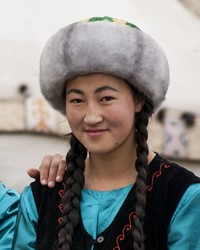Kyrgyz in Uzbekistan

Photo Source:
Theklan - Wikimedia
Creative Commons
|
Send Joshua Project a map of this people group.
|
| People Name: | Kyrgyz |
| Country: | Uzbekistan |
| 10/40 Window: | Yes |
| Population: | 316,000 |
| World Population: | 6,063,100 |
| Primary Language: | Kyrgyz |
| Primary Religion: | Islam |
| Christian Adherents: | 0.30 % |
| Evangelicals: | 0.10 % |
| Scripture: | Complete Bible |
| Ministry Resources: | Yes |
| Jesus Film: | Yes |
| Audio Recordings: | Yes |
| People Cluster: | Kyrgyz |
| Affinity Bloc: | Turkic Peoples |
| Progress Level: |
|
Introduction / History
While most of the Kyrgyz live in their homeland, Kyrgyzstan, large communities can also be found in the Central Asian Republics, China and Russia. Most of these live in the Central Asian Republic of Uzbekistan, primarily in the western portion of the Ferghana Valley. Although they are related to the Kazakh and other Turkic peoples of the region, the Kyrgyz are very Mongol in appearance.
What Are Their Lives Like?
Uzbekistan and Kyrgyzstan are two countries that share a disputed border. For that reason, the Kyrgyz are probably not welcomed by their Uzbek neighbors. The existence of someone from a rival ethnic group is often looked upon with suspicion.
More than any other Central Asian people, the Kyrgyz have clung to their traditional way of life as nomadic livestock producers, and they do this in other Central Asian countries like Uzbekistan.
They have also maintained their tribal organization. The basic unit of their society is the extended family, which consists of between five and fifteen families who have all descended from a common ancestor. They form villages by combining five to seven extended families. Above the villages are numerous clans and tribes.
What Are Their Beliefs?
Consecutive waves of Islamization have taken place since the Arabs first invaded Talas in 751 when many Kyrgyz tribes were still in Siberia. Northern nomadic tribes were able to skirt many of the Islamic traditions until recently. Within the last two hundred years, most of the Kyrgyz had been completely converted to Islam. Today, most Kyrgyz still consider themselves to be Muslim; however, they hold onto some shamanistic practices. (Shamanism is the belief that there is an unseen world of many gods, demons, and ancestral spirits that must be dealt with through a shaman). Many people still turn to mediums and seers to cure sickness with magic, communicate with spirits, and control events. Almost all Kyrgyz believers have to go through a breaking of demonic powers over their lives once they decide to follow Christ. The Kyrgyz epic hero Manas has taken on god-like status among some Kyrgyz. His story reveals many practices and beliefs of the pre-Islamic Kyrgyz. There have been some comparisons made between the biblical "Manasseh son of Jacob" (Genesis 48) and the Kyrgyz "Manas son of Jakyb."
What Are Their Needs?
The Kyrgyz people have no hope in their spiritual lives. God desires that they will come to know abundant life through His son, Jesus Christ. The tragic reality, however, is that the Kyrgyz are unaware of the redeeming blood of Christ and that eternal life is theirs through him.
Prayer Points
Pray for the Kyrgyz people to have hearts that are open to the abundant blessings of Jesus Christ. Pray for Kyrgyz families to prosper financially and spiritually as they experience a relationship with Jesus Christ. Pray for a movement to Christ among the Kyrgyz that will spread joy, peace and salvation to other peoples. Pray for the Lord to thrust out workers to this harvest field. Pray for the Kyrgyz culture to be renewed and enhanced by a work of the Holy Spirit and shaped into a God-centered and God-honoring mold.